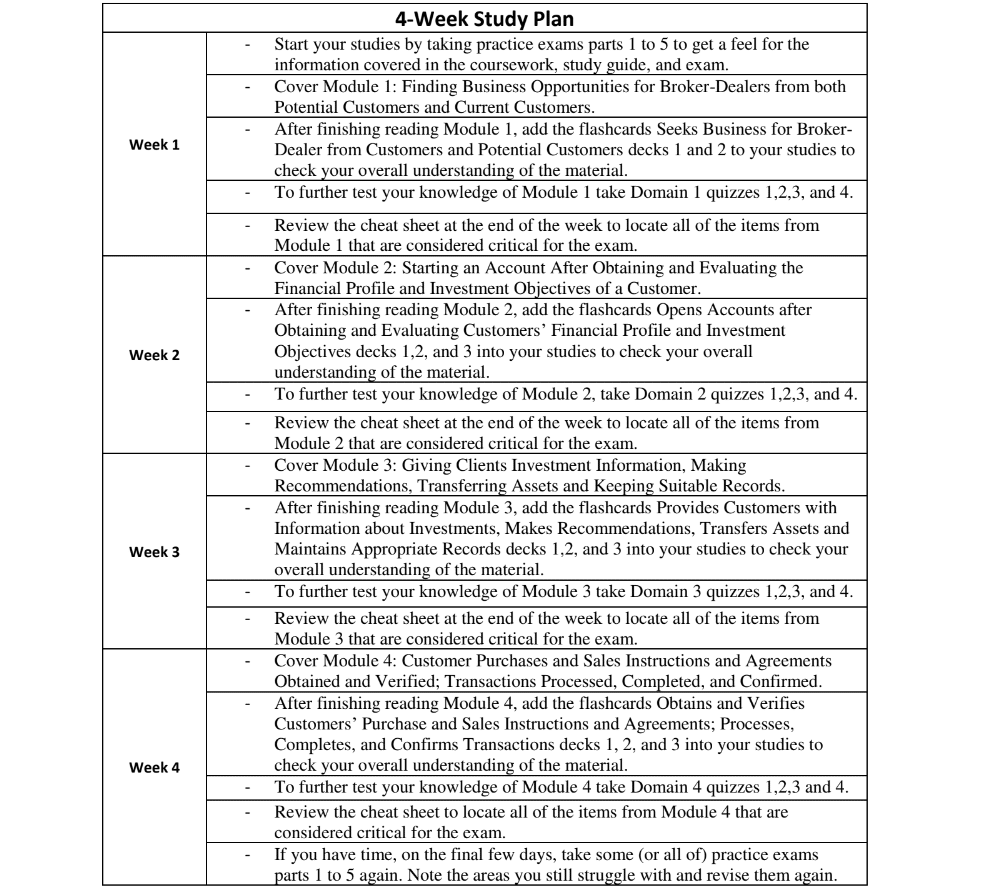Hey there! Welcome to our informative guide on Series 7 study plan.
This is our second article in the Series 7 study hub.
Since we know time management is crucial in exam preparation, we’ve created one, three, six, and twelve months’ Series 7 study calendars to help you put in the study hours required to prepare for the exam adequately.
You can download the study plan that fits your schedule below.
Other free series 7 study materials:
- Series 7 exam prep
- Series 7 study plan
- Series 7 study guide
- Series 7 practice exams
- Series 7 flashcards
- Series 7 cheat sheet
- Series 7 Exam FAQ
- Best Series 7 study materials

Apart from that, we also have an overview of how long it takes to study for the Series 7 exam, tips to make the most of a study plan, and how you can create one.
In brief, we’ll cover:
- How long does it take to study for the Series 7 exam?
- How to create an effective study plan
- Tips to make the most of your study plan
Without further ado, let’s get started.
How Long Does It Take to Study for the Series 7 Exam
The duration it takes to study for the general securities representative exam varies depending on the individual.
According to Professional Exam Tutoring, it takes 1.5 to 2 times more time to study for the Series 7 top-off exam than for the SIE exam.
So, if you took a month for the securities industry essentials, there are high chances you’ll take two months to get ready for Series 7.
That aside, most Series 7 exam prep course providers project that it takes most Series 7 exam test-takers around 80-100 hours.
If you don’t have background experience or education in finance, business, or economics, you may take longer, around 150 hours.
But since the exam is sponsored by a FINRA member firm, your employer may limit your study time.
That means you may have less time to thoroughly prepare for the exam.
The pressure from the employer is likely to make it challenging to cover the Series 7 study materials.
So, what can you do to ensure your test prep yields?
Use the Right Study Materials
The Series 7 exam is difficult even for those with a background in business.
So, confirm beforehand the prep course provider that your company goes for.
If they are not renowned for the best prep materials, you’ll have to purchase additional materials online.
You can get a study guide, flashcards, and practice exams online to help you make the most of your Series 7 prep time.
Focus More on the Highly Weighted Sections
Since you don’t have the time to go through the Series 7 exam content back to back, you need to use the short study period effectively.
So, focus on what matters.
Suitability and options should be your top priority because they make up a big percentage of the exam.
The good news is that studying suitability forces you to read about products because you can only make investment recommendations if you know about securities products.
You’ll also have to dig deeper into your study to determine which financial products best fit a client.
Memorize Acronyms
We agree that understanding the Series 7 exam content is paramount.
However, when you are short of time, you must think on your feet.
Memorizing acronyms may be your life saver and help you get extra points in the actual exam.
Memorize acronyms such as TAN, FRB, FNMA, PAC, TAC, GNMA, BLISS, and BAN.
Have a Series 7 Exam Cheat Sheet at Hand
A cheat sheet is a great way to help you grasp definitions, regulations, and key concepts.
Most online courses have downloadable cheat sheets.
We have a downloadable Series 7 cheat sheet you can leverage.
Review the cheat sheet for at least 30 minutes to an hour daily.
Take a special focus on the areas that are difficult to stick to.
Get a Tutor
Using a tutor can enhance your Series 7 exam performance significantly.
A tutor can be a professional or a friend who has taken the Series 7 exam and passed it.
Also, leverage video lectures to better understand concepts.
With these study tips, you can reduce your study time significantly.
At the same time, you’ll increase your chances of getting the passing score on the first trial.
That means you’ll kill two birds with one stone, taking the exam within your employer’s timelines and passing the exam the first time.
How to Create an Effective Study Plan
While an already-done study calendar makes your work easy, you may opt to make one yourself.
If that happens, we want to ensure you have all the information you need to do an impressive job.
Here are tips for creating an effective Series 7 study plan.
Analyze Your Schedule, Study Habits, and Learning Style
What works for one person may not work for the other.
So, take your time to analyze your daily schedule.
How much time can you commit to studying?
Block all your commitments to see how much time you can dedicate to Series 7 exam prep.
Next, what are your study habits?
Do you prefer short bursts or long periods of time?
What time of the day works best for you?
You want to settle for the time that you are most productive, or rather when you have ample time to study.
Suppose you have a tight schedule.
You’ll have to get creative and move some commitments around.
Plan How Much You Need to Study for Each Section
Series 7 exam has four sections.
Each domain is weighted differently.
That means the time you dedicate to each domain should align with how it’s tested in the actual exam.
Balance between the highly weighted subjects with the less weighted ones.
Take the study plan as serious as you do your job.
Evaluate Your Study Plan and Adjust
A study plan is not cast in stone.
You need to try it out to find out if it works for you.’
If you don’t have enough time or you are not getting the results you hoped for, it’s time to switch things up until you find what works for you.
A study plan helps you manage your time.
It also boosts your productivity.
Tips to Make the Most of Your Series 7 Study Plan
Having a study plan is one thing and using it to the maximum is another.
A Series 7 study calendar gives you an overview of the topics you need to study and how long each session takes.
With the study calendar outline, it’s time to put your best foot forward and ensure it meets its purpose.
Here is how you can make the most of the Series 7 exam calendar.
Establish Specific Study Goals
Simply saying, you’ll study municipal securities as per your schedule won’t cut.
You need to be precise to get something out of your study time.
Each session should have not only the topic to study but also a specific, actionable step you intend to take during the study session.
You can reframe your goal to “use the study guide to study municipal securities and go through flashcards on the same topic.”
The objective clears any ambiguity and tells you exactly how you’ll tackle your study session.
Each study session should have a clear goal of what you want to accomplish.
Commit to Studying
While this may seem obvious, it requires more than simply reading about retirement plans, for example, and moving to the next item on the Series 7 study plan.
Sticking to your study schedule will require discipline.
You’ll need around 30 days for the schedule to sync with your other daily routines.
So, stick to it until it becomes second nature.
The next step of your commitment is creating a well-lit, quiet environment.
When studying, eliminate all forms of distractions.
Ensure you have all the study resources so you don’t waste time returning to pick them up.
Limit the study time for each topic to 1-2 hours.
Beyond 2 hours, your concentration deteriorates.
Take a break.
And when you come back, switch to another topic.
Make it a habit to switch up your schedule once in a while.
You can also change your study area and even study technique depending on the topic.
And finally, when you have free time, say you are commuting, you can spare a few minutes to go through flashcards.
You must prioritize your exam preparation if you are genuinely interested in becoming a Registered Representative.
Schedule Study Time Around Your Most Productive Hours
When are you most productive?
The answer to this question will help prepare for the real exam.
In your schedule, the most challenging topics should be during the most productive hours.
The other topics you find easy to grasp can be at any other time.
Provide Spaced Review
Set some time in your study calendar to simply review all the information you’ve consumed thus far on every topic.
You can spend 30 minutes to an hour for review every time you want to study a new chapter.
This habit will help you save time in the long run.
When you keep refreshing the information learned in the previous session, your brain can easily remember that information in the next session.
You review it again and again until it sticks.
Make use of practice tests or end-of-chapter quizzes to better reinforce information learned.
Don’t Steal Time, Trade It
Time and again, your study time may be taken by other equally important commitments.
When that happens, don’t let it slide.
Look for a way to compensate for that time.
You can adjust your weekly schedule or substitute one of your other commitments.
The goal is to ensure you cover every item in your study calendar daily.
The Next Step in Your Series 7 Exam Preparation
Series 7 study plan helps you schedule enough time to prepare for the final exam.
Thus, we’ve put together a comprehensive study calendar you can download right away to help with your exam preparation.
If you put in the hours, there is no doubt that you’ll have a field day on the exam day.
You can also leverage our many Series 7 study tools covered in this series.
All the best as you prepare for one of the most crucial exams in becoming a Financial Advisor.
Series 7 Study Plan FAQs
How long does it take to study for the Series 7 exam?
The duration depends on your experience level. It takes 80-100 hours if you have experience in the security and financial industry. Without experience, expect to spend around 150 hours. The FINRA Series 7 exam has four domain areas, each weighted differently.
Is the Series 7 exam hard?
The Series 7 exam is considered the most difficult FINRA exam. The exam has a passing score of 72%. And only 65% of exam takers pass on the first attempt. The exam requires thorough preparation. Use practice questions, a cheat sheet, a study guide, and flashcards to retain information.
How many pass the Series 7 on the first try?
Only 65% of the test-takers pass the exam on the first trial. Passing the Series 7 exam requires commitment. Settle for prep course providers with up-to-date study materials. Create enough time to review the materials. Use a question bank to cover topic questions. Make sure to take full-length practice exam questions.
Where can I study for the Series 7 exam?
There are several Series 7 exam prep providers. Depending on your learning style, you can sign up for self-study packages, in-person classes, or a combination. Top Series 7 prep course providers include:
– Kaplan Financial Education
– Securities Training Corporation
– Knopmanmarks
– ExamFX
– Achievable
– Securities Institute of America
What should I do the night before Series 7?
– Rest your mind. You can watch a movie, go out for dinner, etc.
– Pack the items you should bring to the exam, e.g., your ID
– Set your alarm clock
– Go to bed early. You need to be well-rested before the exam.
What are the most important things to know for the Series 7 exam?
The key topics you should know in the Series 7 exam include:
– Margin
– Rules and regulations
– Suitability
– Taxation
– Municipal debt securities
– Options
– Mutual funds
You can spend 2-3 hours studying these topics on a rotational basis.
What are the best books for the Series 7 exam?
Here is a list of some of the best Series 7 books.
– Wiley Series 7 Exam Review 2017
– Pass The 7: A Plain English Explanation
– Series 7 Exam Prep Study Guide
– Series 7 Exam Prep 2016: 500 Questions
– Series 7 Exam For Dummies
What should I do during the week before the Series 7 exam?
The week before the exam, review the Series 7 exam content outline. Identify your areas of strength and weakness.
You can skim through the topics you are familiar with and put more effort into the topics you are weak in. You need to solidify your knowledge in all areas.
How many questions are there on Series 7?
The Series 7 exam contains 135 multiple-choice questions. Here, 125 questions are scored, while ten are not scored. The exam takes 3 hours and 45 minutes to complete. You have around one minute and a few seconds to answer each question. Make it count.
What is the Series 7 study plan?
A Series 7 study plan or calendar allocates time according to your availability to help you have a well-defined learning program. Using a study plan, you’ll have a daily study routine that considers your work, family responsibilities, and other commitments.
References









